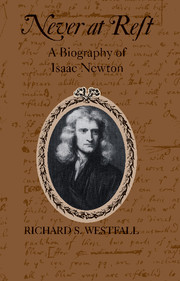Book contents
- Frontmatter
- Contents
- Preface to the paperback edition
- Preface
- Acknowledgments
- A note about dates
- Abbreviations used in footnotes
- 1 The discovery of a new world
- 2 A sober, silent, thinking lad
- 3 The solitary scholar
- 4 Resolving problems by motion
- 5 Anni mirabiles
- 6 Lucasian professor
- 7 Publication and crisis
- 8 Rebellion
- 9 Years of silence
- 10 Principia
- 11 Revolution
- 12 The Mint
- 13 President of the Royal Society
- 14 The priority dispute
- 15 Years of decline
- Bibliographical essay
- List of illustrations
- Index
- General index
1 - The discovery of a new world
Published online by Cambridge University Press: 05 June 2013
- Frontmatter
- Contents
- Preface to the paperback edition
- Preface
- Acknowledgments
- A note about dates
- Abbreviations used in footnotes
- 1 The discovery of a new world
- 2 A sober, silent, thinking lad
- 3 The solitary scholar
- 4 Resolving problems by motion
- 5 Anni mirabiles
- 6 Lucasian professor
- 7 Publication and crisis
- 8 Rebellion
- 9 Years of silence
- 10 Principia
- 11 Revolution
- 12 The Mint
- 13 President of the Royal Society
- 14 The priority dispute
- 15 Years of decline
- Bibliographical essay
- List of illustrations
- Index
- General index
Summary
NEWTON'S name in the matriculation book of Cambridge University on 8 July 1661, together with those of sixteen other students recently admitted to Trinity College, bears witness to an event so obviously significant in his life (as it must have been for the other sixteen, and as similiar events have been for countless young men through eight centuries of Western history) that one flirts with banality even to mention it. He had left his home in the hamlet of Woolsthorpe in Lincolnshire some five weeks earlier, a raw provincial youth venturing more than ten miles from the place of his birth probably for the first time. He had been admitted to Trinity College on 5 June. As it turned out, the change in scene involved much more than the inevitable shattering of rural provincialism. In Cambridge, Newton discovered a new world. In one sense, of course, every youth who truly enters a university discovers a new world; such is the process of education, the opening of fresh horizons. Newton discovered a new world in a more concrete sense of the phrase, however. By 1661, the radical restructuring of natural philosophy that is called the scientific revolution was well advanced. Behind the familiar facade of nature, philosophers – we would call them scientists – had indeed discovered a new world, a quantitative world instead of the qualitative world of daily experience, mechanistic instead of organic, indefinite in extent instead of finite, an alien world frightening to many but in its challenge thrilling to some.
- Type
- Chapter
- Information
- Never at RestA Biography of Isaac Newton, pp. 1 - 39Publisher: Cambridge University PressPrint publication year: 1981



